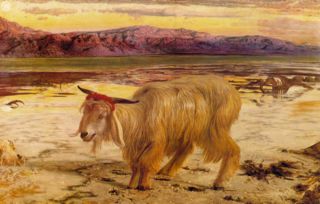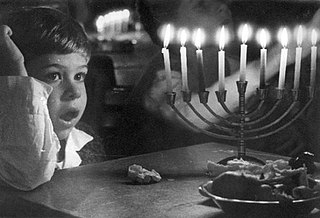Related Research Articles
Kodashim is the fifth of the six orders, or major divisions, of the Mishnah, Tosefta and the Talmud, and deals largely with the services within the Temple in Jerusalem, its maintenance and design, the korbanot, or sacrificial offerings that were offered there, and other subjects related to these topics, as well as, notably, the topic of kosher slaughter of animals for non-sacrificial purposes.
In Judaism, the korban, also spelled qorban or corban, is any of a variety of sacrificial offerings described and commanded in the Torah. The plural form is korbanot, korbanoth or korbans.
Kinnim is a tractate in the order of Kodshim in the Mishna. The name, meaning "nests", refers to the tractate's subject matter of errors in bird-offerings. It is the last tractate in the order, because of its shortness and because it deals with a very rare and unusual area of Jewish law.
In the Hebrew Bible, semicha refers to the priest's placing of his hands before the offering of a korban in the Temple in Jerusalem. This involved pressing firmly on the head of the sacrificial animal, thereby symbolically "transmitting" sins onto the animal or, in other interpretations, to transform the sacrifice into an offering acceptable to HaShem.

Tractate Temurah is a tractate of the Mishnah, Tosefta, and Babylonian Talmud, which is part of the Order of Kodashim. Its main subject is the Biblical prohibition against attempting to switch the sanctity of an animal that has been sanctified for the Temple in Jerusalem with another non-sanctified animal. If this is attempted, both animals become sanctified, and the person who attempted the transfer is punished with lashes.

Parashat Vayikra, VaYikra, Va-yikra, or Wayyiqra is the 24th weekly Torah portion in the annual Jewish cycle of Torah reading and the first in the Book of Leviticus. The parashah lays out the laws of sacrifices. It constitutes Leviticus 1:1–5:26.

Tzav, Tsav, Zav, Sav, or Ṣaw is the 25th weekly Torah portion in the annual Jewish cycle of Torah reading and the second in the Book of Leviticus. The parashah teaches how the priests performed the sacrifices and describes the ordination of Aaron and his sons. The parashah constitutes Leviticus 6:1–8:36. The parashah is made up of 5,096 Hebrew letters, 1,353 Hebrew words, 97 verses, and 170 lines in a Torah scroll. Jews read it the 24th or 25th Sabbath after Simchat Torah, generally in the second half of March or the first half of April.
Terumot is the sixth tractate of Seder Zeraim of the Mishnah and of the Jerusalem Talmud. This tractate discusses the laws of teruma, a gift of produce that an Israelite farmer was required to set aside and give to a kohen (priest). There were two kinds of terumot given to the priest: the regular heave-offering, known also as the terumah gedolah, which the Israelites were required to give to the priest from the produce of their fields; the other was the terumat ma'aser, namely, the gift that the Levites were required to put aside for the priests from the tithe which ordinary Israelites had been required to give to them.

Pesachim, also spelled Pesahim, is the third tractate of Seder Moed of the Mishnah and of the Talmud. The tractate discusses the topics related to the Jewish holiday of Passover, and the Passover sacrifice, both called "Pesach" in Hebrew. The tractate deals with the laws of matza and maror, the prohibitions against owning or consuming chametz (leaven) on the festival, the details of the Paschal lamb that used to be offered at the Temple in Jerusalem, the order of the feast on the first evening of the holiday known as the Passover seder, and the laws of the supplemental "Second Pesach".
Makot is a tractate of the Mishnah and Talmud. It is the fifth volume of the order of Nezikin. Makkot deals primarily with laws of the Jewish courts and the punishments which they may administer, and may be regarded as a continuation of tractate Sanhedrin, of which it originally formed part.

Horayot is a tractate in Seder Nezikin in the Talmud. In the Mishnah, this is the tenth and last tractate in Nezikin; in the Babylonian Talmud the ninth tractate; in the Jerusalem Talmud the eighth. It consists of three chapters in the Mishnah and two in the Tosefta. The tractate mainly discusses laws pertaining to erroneous rulings by a Jewish court, as well as unwitting actions performed by leading authorities of the Jewish people, and the sacrificial offerings that might be brought as a consequence of these actions. The conclusion of the tractate (12a-13b) deals with the prioritization of korbanot in the temple and explores the question of how to quantify human life in emergency situations.
Me'ilah is a tractate of Seder Kodashim in the Mishnah, Tosefta, and Babylonian Talmud. It deals chiefly with the exact provisions of the law concerning the trespass-offering and the reparation which must be made by one who has used and enjoyed a consecrated thing.
Tamid is the ninth tractate in the Order of Kodashim, which is the fifth of the six orders of the Mishnah, Tosefta and the Talmud. The main subject of Tamid is the morning and evening burnt offerings, but it also deals with other Temple ceremonies. Its full name is "Olat Tamid". The tractate includes information about the Temple Service from sages who had been present at the Temple and witnessed the service. This tractate in the Talmud does not contain disagreements between the sages nor does it have exegetical derivations. It is written as a historical description of the service.

Acharei Mot is the 29th weekly Torah portion in the annual Jewish cycle of Torah reading. It is the sixth weekly portion in the Book of Leviticus, containing Leviticus 16:1–18:30. It is named after the fifth and sixth Hebrew words of the parashah, its first distinctive words.

Naso or Nasso is the 35th weekly Torah portion in the annual Jewish cycle of Torah reading and the second in the Book of Numbers. It constitutes Numbers 4:21–7:89. The parashah addresses priestly duties, camp purification, restitution for wrongs committed, the wife accused of unfaithfulness, the nazirite, the Priestly Blessing, and consecration of the Tabernacle. Naso has the largest number of letters, words, and verses of any of the 54 weekly Torah portions. The parashah is made up of 8,632 Hebrew letters, 2,264 Hebrew words, 176 verses, and 311 lines in a Torah Scroll.
Nazir is a treatise of the Mishnah and the Tosefta and in both Talmuds, devoted chiefly to a discussion of the laws of the Nazirite laid down in Numbers 6:1-21. In the Tosefta its title is Nezirut ("Nazariteness"). In most of the editions of the Mishnah, this treatise is the fourth in the order Nashim, and it is divided into 9 chapters, containing 48 paragraphs in all.

Shabbat is the first tractate of Seder Moed of the Mishnah and of the Talmud. The tractate deals with the laws and practices regarding observing the Jewish Sabbath. The tractate focuses primarily on the categories and types of activities prohibited on the Sabbath according to interpretations of many verses in the Torah, notably Exodus 20:9–10 and Deut. 5:13–14.
The Hebrew term kareth is a form of punishment for sin, mentioned in the Hebrew Bible and later Jewish writings. The word kareth is derived from the Hebrew verb karat. The noun form kareth does not occur in the Hebrew Bible. The plural, Kerithoth ("Excisions"), is the seventh tractate of the fifth order Kodashim of the Mishnah. In the Talmud, kareth means not necessarily physical "cutting off" of life, but extinction of the soul and denial of a share in the world to come.

Nedarim is a masechet of the order of Nashim of the Mishnah and the Talmud. Its subject is laws relating to the neder, a kind of vow or oath in Judaism.
Zevachim is the first tractate of Seder Kodashim of the Mishnah, the Talmud and the Tosefta. This tractate discusses the topics related to the sacrificial system of the Temple in Jerusalem, namely the laws for animal and bird offerings, and the conditions which make them acceptable or not, as specified in the Torah, primarily in the book of Leviticus. The tractate has fourteen chapters divided into 101 mishnayot, or paragraphs. There is a Gemara – rabbinical commentary and analysis – for this tractate in the Babylonian Talmud, and no Gemara in the Jerusalem Talmud.